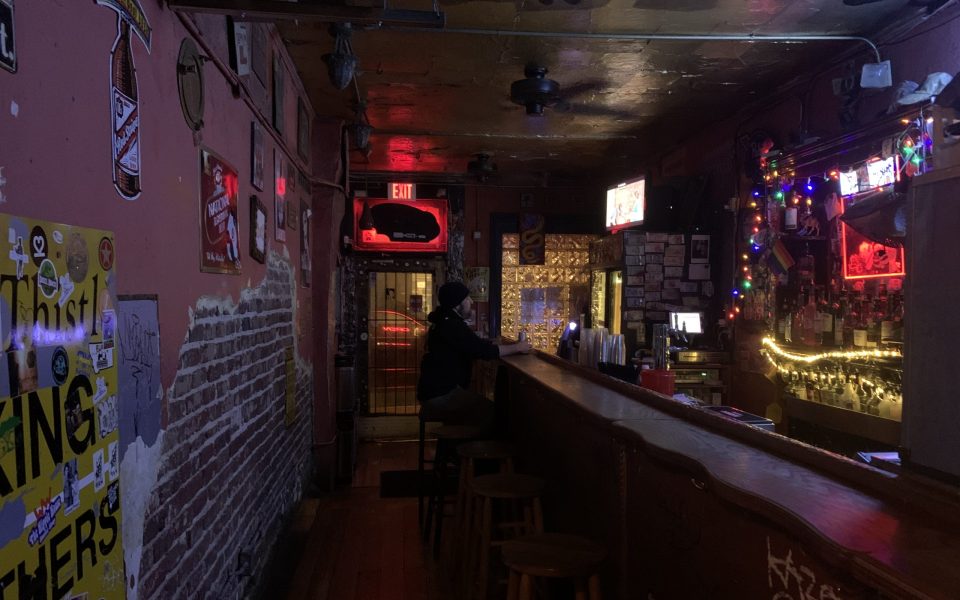I sit down and light a cigarette. It’s 2:30 a.m., and while I can still hear various voices out on the street, the doors are locked. A regular asked me to call him a cab 15 minutes ago, and he’ll be standing outside for the next 45, minimum. At least he’s calling a cab. Others wander to and fro in front of the locked door, aimless, like zombies. The old refrain, “You don’t have to go home but you can’t stay here” has merit on nights like these. Before I count the register, before cleaning, before stocking, some nights I just sit, if just for a few minutes. There are nights like, “Something was in the air tonight,” or “It’s a full moon, the crazies came out!” And then some nights you are off your game. Sometimes, every bad customer in town shows up on the same night to remind you that they still exist. The fighters, the creeps, the stiffers, the yellers, the particulars, the “Let me buy the house a shot” ballers.
Some nights, you have to sit down in the silence, stare in the middle distance, ignore the tinnitus that is creeping its way in now that the music is finally off, now that the night is mercifully over.
“What in the hell,” I ask the empty bar, “was that?” The building doesn’t reply, as always. It’s been here since 1905, too old to be answering any questions. I receive a text from a colleague down the street, talking about the night they’ve just had.
“People were out of control this weekend,” they said.
It’s rougher these days, by most accounts.
Many reject the idea of shared trauma and mass hysteria as a cop-out for people’s behavior, but there is a definite line separating “then” and “now.” The service industry is not immune, in fact; they get the brunt of it. Nearly every day, there’s a story about a server, bartender, or chef taking abuse from customers. Niki Farrington, executive chef at Willow’s Bistro, shared an encounter with a customer who screamed in her face during a busy Saturday night: “IT’S YOUR FAULT!” in a packed dining room after their meal was delayed. She handled it with “grace, compassion and composure.” A bartender at a popular bar experienced the “worst shift [they’ve] ever had” recently which included a packed house, a staff shortage and screaming customers, including one who got in her face and said, “This bitch can’t do her job” while she was doing precisely that.
Instances like these are intensely degrading and most jobs would fire the workers if they were to respond in kind. We’re seeing the effects of corporate policies that insist that the customer is always right. We’ve all seen it: a customer causes an unnecessary scene, loudly shaming their young server. And instead of being asked to immediately leave for having a tantrum and vocally assaulting their server, a slouching manager shuffles out of the kitchen. A company man through and through, the type of guy who calls everybody “chief,” he arrives just to comp their meal and hand out gift cards. Not so much as a tap on the wrist.
Naturally, many are realizing that they don’t have to tolerate low pay, abusive customers and predatory management policies. The sheer amount of patience that’s required to tolerate abusive customers is physically and emotionally draining, so it’s only natural to move on. Employees used to be easily replaceable at some places, not so much these days.
I try to react as Niki would, and none of us are always successful. We’re all stressed out nowadays. It’s not much to expect people to generally be decent. Working at a dive bar, it’s easier to address someone’s behavior and still keep your job. If a customer is being a problem, that’s it. AMF. They’ve probably had enough or didn’t need to be there in the first place. Most bars do that; that’s how they retain good customers. Imagine if a restaurant had the same policy.
I clean up in blessed silence, thankful that the night wasn’t terrible. Tiring is different from terrible.
Join the First Amendment Society, a membership that goes directly to funding TCB‘s newsroom.
We believe that reporting can save the world.
The TCB First Amendment Society recognizes the vital role of a free, unfettered press with a bundling of local experiences designed to build community, and unique engagements with our newsroom that will help you understand, and shape, local journalism’s critical role in uplifting the people in our cities.
All revenue goes directly into the newsroom as reporters’ salaries and freelance commissions.


Leave a Reply